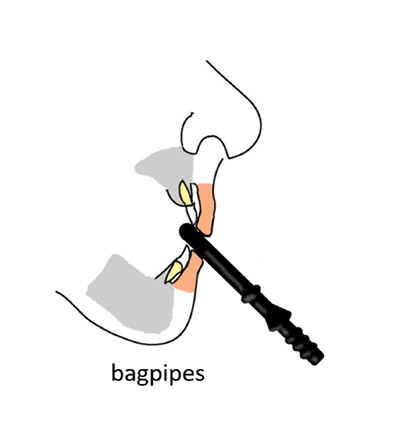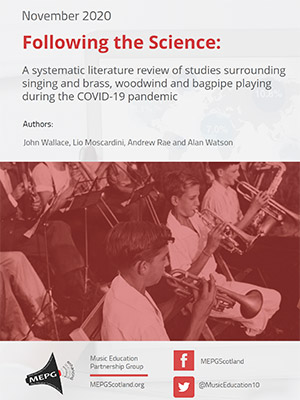
A report by leading musicians and scientists has labelled the media’s demonising of the playing of pipes and other woodwind instruments during the Covid-19 pandemic as ‘simply wrong’ and that when suitable mitigations are in place the practice posed no aditional risk at social gatherings.
Their comprehensive report is entitled ‘Following the Science: A systematic literature review of studies surrounding singing and brass, woodwind and bagpipe playing during the COVID-19 pandemic’.
Its findings could have a bearing on how education authorities and politicians view the current ban on schools pipe bands, piping lessons and indeed civilian pipe bands. The report offers advice on how bands could approach ensemble playing.
At the moment teaching pipes is banned in Scotland’s state schools. Pipe bands are in hibernation, and this less than six months from the first major championship of the 2021 season.
The report was compiled by a body known as the Music Education Partnership Group. It comprises John Wallace, former Principal at the Royal Conservatoire of Scotland, Dr Lio Moscardini, independent education consultant and researcher, Andrew Rae, a data scientist and researcher at the Universities of Strathclyde and Glasgow, and Dr Alan Watson, reader in anatomy and neuroscience at Cardiff University and an Honorary Fellow of the Royal Welsh College of Music and Drama.
The report reads: ‘The current COVID-19 situation has resulted in widespread concern and considerable uncertainty relating to the position of musical performance and in particular potential risks associated with singing and brass, woodwind and bagpipe playing.
‘There is a wide range of advice and guidance available but it is important that any guidance given should be evidence based and the sources of this evidence should be known.’
They asked three questions:
1 What is the evidence in the literature of risk attached to singing, brass, woodwind and bagpipe playing in relation to the spread of airborne pathogens such as COVID-19, through droplets and aerosol?
2 How do these music-making activities relate to other everyday activities such as breathing, talking and exercise in relation to aerosol transmission?
3 What are the recommendations for best practice?
80 relevant papers extracted from a total of 342 were then tested against a consistency checklist.
The report states: ‘During singing and wind playing, large droplets of mucus and saliva may be expelled from the mouth in addition to the micro droplets that are suspended in the breath. These spread into the atmosphere of the teaching and performing spaces.
‘The large droplets are relatively heavy and do not travel far beyond the musician but rapidly sink to the floor. It is to minimise the possibility of infection by these larger droplets that the two-metre rule has been implemented.
‘There is no current available data showing that there is a statistically significant added risk of viral transmission from singing and the playing of brass and wind instruments….’
‘The micro-droplets are smaller and lighter and form what are known as aerosols that travel further and can remain suspended in the air of the performance space for tens of minutes or longer.
‘Whether the number of microscopic particles generated during wind playing is sufficient to pose a significant risk of infection is not yet fully understood, though most of the research makes the reasonable assumption that this is true.
‘Though a considerable number of preliminary studies have been carried out with orchestral wind players, many were not carried out under sterile conditions, which undermines their conclusions and the advice derived from them.
‘Furthermore most have not undergone the quality control process of peer review, which is essential if their findings are to be accepted. However, a few studies have been carried out under highly controlled conditions in rooms demonstrably free of aerosol at the beginning of the experiments, though they are still (as of November 2020) awaiting peer review.
‘These suggest that micro-droplets are not produced in appreciably greater quantities during singing and playing than during normal breathing or speaking. What does seem to produce more particles to greater or lesser degree is moderate to strenuous exercise of any sort, shouting, loud speaking, singing and playing.
‘Outdoor practice and performance is also less likely to see accumulation of small droplets as aerosols than indoor performance, although this is not possible year-round in either temperate or continental climates.
‘Basic hygiene is essential. Common sense measures, such as regular instrumental cleaning regimes always have been, or should be, a regular part of learning and teaching of brass and wind instrument technique.
‘Instrument sharing should not be permitted. Infectious organisms have also been shown to be present in bagpipes. They have been isolated from the bag, mouth pipe [sic] and other parts of the instrument.
‘The discouragement of any build-up of debris that may harbour bacteria and moulds, through regular brushing out and rinsing of instruments and their detachable parts …….. is an absolute….

‘Hygiene extends to the venues, and their catering and toilet facilities. Overcrowding and lack of sufficient amenities add to the risk. Many venues, both outdoor and indoor, will need to be upgraded before they can reopen. Inadequate ventilation is a severe problem in many popular venues and rehearsal spaces.
‘The same applies to many educational establishments, including some recently built schools, which because of soundproofing considerations, have no external windows.
‘Though it has not been studied systematically, evidence of lung infections arising from the playing of brass, woodwind and bagpipes have all been recorded.
‘In the bellows type [of bagpipe], there is no risk of lung infection to the player or to the audience, but in pipes where the bag is inflated through a blowpipe, infectious agents (bacteria, viruses and fungi) carried by the moist air of the breath can build up in the bag and cases of respiratory illness among players are well documented.
‘In such pipes, the bag, which is either made of leather or a synthetic material such as Goretex, must be disinfected regularly…..… Air from the chanter and drones will release droplets and aerosols into the air.
‘During the pandemic there has been a tendency, often through media exposure, to demonise certain musical activities ……. That is simply wrong… ‘
‘The electronic chanter, which does not use air to create the sound, is now available as a practice and even performance instrument. This may be useful in situations where the risks of using the Highland pipes is deemed unacceptable.
‘Music in all its manifestations forms an important component of our societal, cultural, physical and mental health and well-being. Ways can and should be found of continuing the practice of music-making despite the global pandemic.
‘Singing and playing musical instruments are normal and widespread human activities. Their suppression during the pandemic has aroused a great number of scientific investigations.

‘During the pandemic there has been a tendency, often through media exposure, to demonise certain musical activities such as singing, woodwind, brass and bagpipe playing as uniquely aerosol-producing human activities. That is simply wrong.
‘We appear to have been led by subjective judgement rather than objective analysis of the data. Normal breathing and speaking also produce aerosols within the approximately 11,000 litres of air inhaled and exhaled by the average person each day. Moderate to strenuous exercise of any sort, loud speaking and shouting produce a greater number of aerosols.
‘There is no current available data showing that there is a statistically significant added risk of viral transmission from singing and the playing of brass and wind instruments on top of the already considerable risk in gathering socially in both domestic and public settings when suitable mitigations are in place.
Advice in the report:
- Disinfecting surfaces (stands and chairs) before and after use.
- Owning the personal hygiene of your own stand and chair as your own work-station and not sharing with anyone else during the same period of work.
- Using plastic containers and absorbent cloths to collect condensed water emptied from instruments, and disinfecting these after each use.
- No sharing of instruments.
- Reducing the size of ensembles, vocal and instrumental, and reconfiguring the way small ensembles (10 or fewer players/singers) are laid out.
- Handing out and taking in sheet music to be carried out by one person wearing gloves and a face mask. Printed music should be quarantined for 72 hours prior to re-use.
- Ensuring that all audience and performers of strings, keyboard, and percussion in mixed ensembles wear face masks at all times.
- Cleaning instruments thoroughly and hygienically after daily use and where practicable sterilising mouthpieces.
- Clear perspex screen separators (a good idea in ensemble or in the face to face teaching situation).
- Use brass and wind instrument wind shields (as yet untested).



















In all of the Covid restrictions, commonsense has in many cases been ignored by individuals and indeed government bodies. Some individuals have been reckless and others maybe have overreacted. Pointing this out is not necessary as we all know this. The problem is now to restore commonsense as the authorities, in a lot of cases, have painted themselves into a corner and are afraid to do anything other than add to the layers of restrictions lest they are seen to make mistakes.
At last, some common sense has emerged, with some reasonable & practical suggestions and mitigation controls for wind instruments. It has been utterly disappointing that the RSPBA have not become involved, or shown any initiative in preparing for the 2021 season (apart for asking bands for their subs).